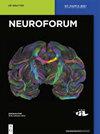身体如何支配鼻子
Q3 Medicine
引用次数: 1
摘要
为了生存,生物体必须通过仔细平衡感官输入与生理状态和需求来适应当前环境。这种挑战在嗅觉刺激(挥发性化学物质)中尤为明显,嗅觉刺激不仅可以发出食物来源、交配对象和后代的信号,还可以发出病原体、竞争对手和捕食者的信号。为了完成这一艰巨的任务,嗅觉系统中的信息处理受到内部状态(例如,代谢或内分泌)、环境背景和先前经验的强烈调节。本文概述了不同的内部状态如何影响嗅觉处理,并讨论了潜在的潜在机制。它首先简要介绍了研究嗅觉的主要模型——小家鼠——并总结了对人类健康和疾病的影响。本文章由计算机程序翻译,如有差异,请以英文原文为准。
How the body rules the nose
Abstract In order to survive, an organism has to adapt its behavioral actions to the current context by carefully balancing sensory input with physiological state and need. This challenge becomes particularly apparent for olfactory stimuli (volatile chemicals), which can signal not only food sources, mating partners, and offspring, but also pathogens, competitors, and predators. To achieve this difficult task, information processing in the olfactory system is strongly modulated by internal state (for example, metabolic or endocrine), environmental context, and previous experience. This article provides an overview how different internal states impact olfactory processing and discusses potential underlying mechanisms. It starts with a brief excurse on a leading model to study olfaction—Mus musculus—and concludes with implications for human health and disease.
求助全文
通过发布文献求助,成功后即可免费获取论文全文。
去求助
来源期刊

Neuroforum
NEUROSCIENCES-
CiteScore
1.70
自引率
0.00%
发文量
30
期刊介绍:
Neuroforum publishes invited review articles from all areas in neuroscience. Readership includes besides basic and medical neuroscientists also journalists, practicing physicians, school teachers and students. Neuroforum reports on all topics in neuroscience – from molecules to the neuronal networks, from synapses to bioethics.
 求助内容:
求助内容: 应助结果提醒方式:
应助结果提醒方式:


